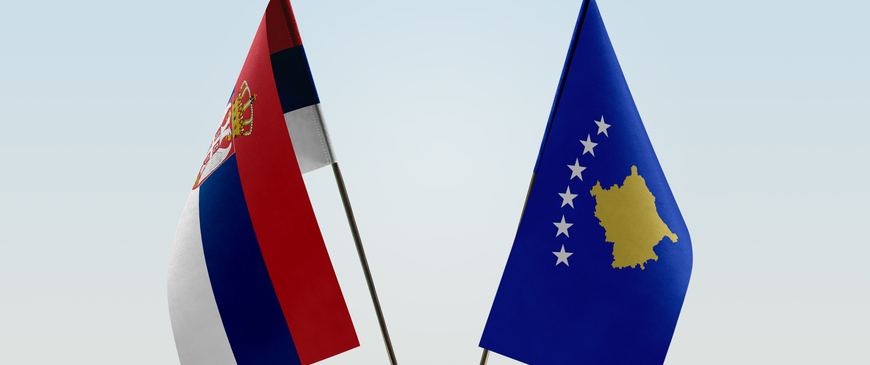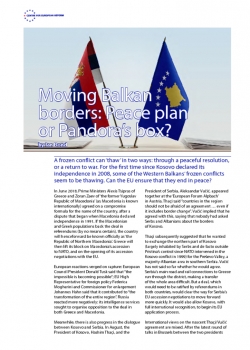
Moving Balkan borders: Peace plan or Pandora's box?
A frozen conflict can ‘thaw’ in two ways: through a peaceful resolution, or a return to war. For the first time since Kosovo declared its independence in 2008, some of the Western Balkans’ frozen conflicts seem to be thawing. Can the EU ensure that they end in peace?
In June 2018, Prime Ministers Alexis Tsipras of Greece and Zoran Zaev of ‘the former Yugoslav Republic of Macedonia’ (as Macedonia is known internationally) agreed on a compromise formula for the name of the country, after a dispute that began when Macedonia declared independence in 1991. If the Macedonian and Greek populations back the deal in referendums (by no means certain), the country will henceforward be known officially as ‘the Republic of Northern Macedonia’. Greece will then lift its block on Macedonia’s accession to NATO, and on the opening of its accession negotiations with the EU.
For the first time since #Kosovo declared its independence in 2008, some of the #WesternBalkans’ frozen conflicts seem to be thawing. Can the #EU ensure that they end in peace?
European reactions verged on rapture: European Council President Donald Tusk said that “the impossible is becoming possible”; EU High Representative for foreign policy Federica Mogherini and Commissioner for enlargement Johannes Hahn said that it contributed to “the transformation of the entire region”. Russia reacted more negatively: its intelligence services sought to organise opposition to the deal in both Greece and Macedonia.
Meanwhile, there is also progress in the dialogue between Kosovo and Serbia. In August, the President of Kosovo, Hashim Thaçi, and the President of Serbia, Aleksandar Vučić, appeared together at the ‘European Forum Alpbach’ in Austria. Thaçi said “countries in the region should not be afraid of an agreement … even if it includes border change”. Vučić implied that he agreed with this, saying that nobody had asked Serbs and Albanians about the borders of Kosovo.
Thaçi subsequently suggested that he wanted to exchange the northern part of Kosovo (largely inhabited by Serbs and de facto outside Pristina’s control since NATO intervened in the Kosovo conflict in 1999) for the Preševo Valley, a majority-Albanian area in southern Serbia. Vučić has not said so far whether he would agree. Serbia’s main road and rail connections to Greece run through the district, making a transfer of the whole area difficult. But a deal, which would need to be ratified by referendums in both countries, would clear the way for Serbia’s EU accession negotiations to move forward more quickly. It would also allow Kosovo, with full international recognition, to begin its EU application process.
A deal between #Serbia and #Kosovo would clear the way for Serbia’s #EU accession negotiations to move forward more quickly. It would also allow for Kosovo, with full international recognition, to begin its EU application process.
International views on the nascent Thaçi/Vučić agreement are mixed. After the latest round of talks in Brussels between the two presidents on September 7th, Mogherini did not refer explicitly to the land swap proposal, but said in a statement that any settlement must be in line with international law. The US National Security Adviser, John Bolton, said that the US did not exclude territorial swaps, but that the parties had to sort it out for themselves. German Chancellor Angela Merkel, however, made clear her opposition to redrawing boundaries. A Foreign Office minister, Alan Duncan, told Serbian media on September 20th to be careful about changing borders, for fear of causing “earthquakes and new crises for the people in the region”.
Elsewhere, reactions have been more negative than positive. Three former international High Representatives in Bosnia, Paddy Ashdown, Carl Bildt and Christian Schwarz-Schilling, and more than 50 experts on the Western Balkans wrote open letters opposing the deal. Among other things, they were concerned that the Serbs of Republika Srpska (RS – part of Bosnia), would exploit the precedent to justify breaking up the Bosnian state. Edward Joseph, an American former senior international official in the region, also warned of the risk of inflaming the Albanian minority in Macedonia, potentially leading to that country’s partition. On the other hand, former senior US National Security Council official Charles Kupchan, despite calling the deal “peaceful ethnic cleansing”, urged US support for it, as the best chance of achieving lasting peace between Kosovo and Serbia.
In private, EU officials stress that they would rather that border changes had not become the central element in a settlement, and are not actively promoting them. They underline that any deal must also be acceptable to EU member-states (including Cyprus, Greece, Romania, Slovakia and Spain, which still do not recognise Kosovo’s independence) and must not destabilise neighbouring countries. And a deal must respect the rights of minorities – most of the Serbs in Kosovo live outside the area that would be transferred to Serbia, and one of the three towns in the Preševo Valley is majority Serb. But the EU would also regard agreement between Thaçi and Vučić as a big step forward, not least because the two would have reached a solution by themselves, rather than having it imposed on them by foreign powers.
The #EU would also regard agreement between #Serbia and #Kosovo as a big step forward, not least because the two would have reached a solution by themselves, rather than having it imposed on them by foreign powers.
The EU believes that the prospect of enlargement will be enough to guarantee agreement between Kosovo and Serbia, especially now that Serbia (as well as Montenegro) has been told that it can join the EU by 2025, if it fulfils the EU’s membership requirements. Brussels also seems confident that Vučić will be able to keep the RS leader Milorad Dodik under control, in the interests of Serbia’s EU membership process. Western officials in the region think that Brussels may be too relaxed on both points (though RS did not break away when Montenegro or Kosovo declared independence from Serbia in 2006 and 2008 respectively).
There is already opposition to land swaps from nationalist politicians in Kosovo including Prime Minister Ramush Haradinaj, and from the Serbian Orthodox Church. Neither Thaçi nor Vučić can be sure of winning referendums on any deal. And Russia will be working to prevent its ‘little brother’, Serbia, and neighbouring countries moving towards EU and, in most cases, NATO membership. In Ukraine, Russian disinformation about the EU-Ukraine association agreement played a significant part in creating anti-Western hostility in eastern Ukraine before Moscow’s 2014 intervention.
If there is to be a deal, regardless of content, the EU will need a pro-active information campaign showing how Kosovo and Serbia will benefit from settling their differences. Moreover, those who worry that a land swap will set a precedent for Bosnia are not merely being alarmist: Bosnia is fragile, and the Bosnian Croats are as likely as the Bosnian Serbs to try to use any opportunity to undermine the state’s integrity. The EU cannot leave it to Vučić to keep Bosnia in one piece.
Despite the risks, however, if Belgrade and Pristina can reach agreement, their progress should not be held hostage by Bosnia’s dysfunction and its unscrupulous politicians. The EU’s focus should be on minimising the risks of negative spill over in other parts of the region; and then on ensuring that Serbia and the other Western Balkans states do what they need to in order to join the EU, thus reducing the importance of the borders between them. The last thing left in Pandora’s box was hope; if Thaçi and Vučić (like Tsipras and Zaev) think they can give some of it to the region, they should be given the chance to try.
Ian Bond is director of foreign policy at the Centre for European Reform.

